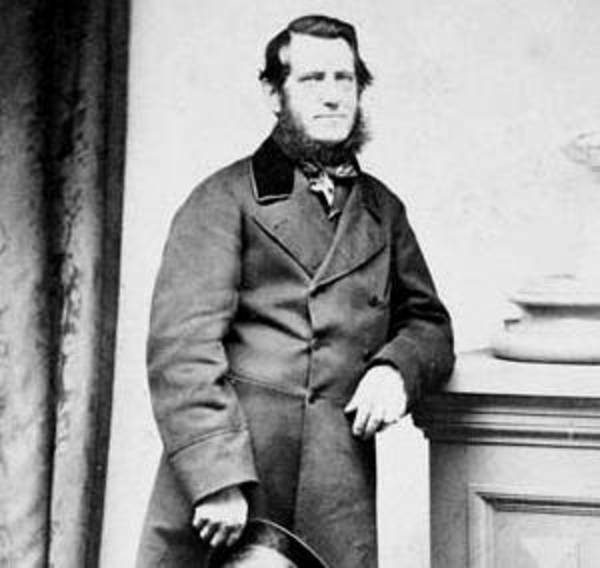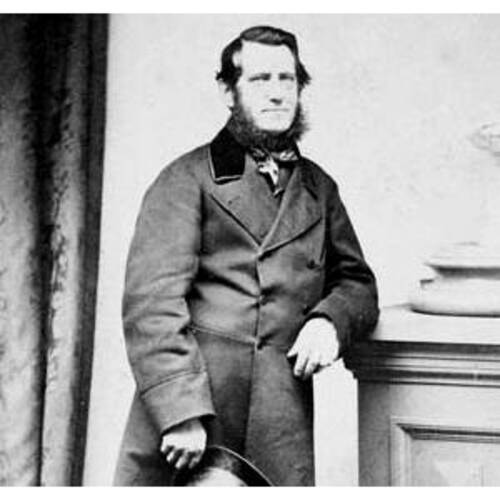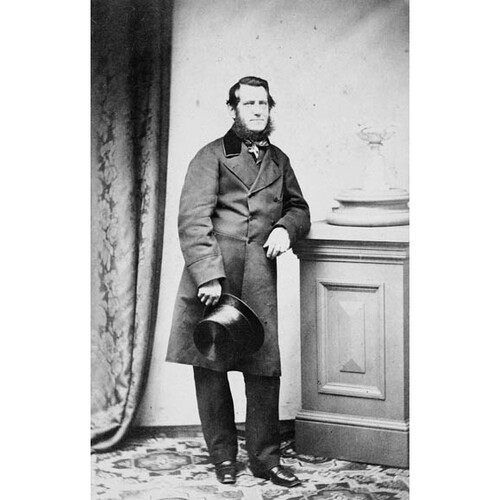
Source: Courtesy of Wikimedia Commons
SMITH, SIDNEY, lawyer, politician, and officeholder; b. 16 Oct. 1823 at Port Hope, Upper Canada, son of John David and Augusta Louisa Smith; m. 21 Jan. 1845 Mary Ann Bennett of Cobourg, Canada West, and they had five sons and one daughter; d. 27 Sept. 1889 at Cobourg.
Sidney Smith was born of a uel family; his paternal grandfather, Elias, a successful merchant and trader, left New York and settled in Upper Canada, where he was a founder in 1792 of what was to become Port Hope. Sidney’s father, John David, a merchant and distiller, sat in the House of Assembly of Upper Canada for Durham from 1828 to 1830. Sidney was educated privately and in the grammar school at Port Hope. He then studied law in the office of his brother, John Shuter, with whom he was later a partner, and was admitted to the bar in 1844. He was to continue the practice of law throughout his life, practising first in Cobourg, where he also acted as solicitor for the Commercial Bank of the Midland District, the Bank of Montreal, the Midland Railway of Canada, and the town of Cobourg, and then in Peterborough. In 1853 he was elected a municipal councillor for both Cobourg and the township of Hamilton, and was the warden for Northumberland and Durham.
The following year Smith was elected as a Reformer to the Legislative Assembly for Northumberland West and he was re-elected in 1857. He supported the administration of Sir Allan Napier MacNab* and Augustin-Norbert Morin* in 1854 and 1855 before going over to the opposition in 1856. From 2 Feb. 1858 until the government’s defeat on the Militia Bill in May 1862, Smith was postmaster general, in the cabinet of John A. Macdonald* and George-Étienne Cartier* and also a member of the Board of Railway Commissioners, except for the period of the “double shuffle” in August 1858. In one of the moves of that shuffle he was for 24 hours president of the council and minister of agriculture. Following the “double shuffle,” John A. Macdonald, Philip Michael Matthew Scott VanKoughnet*, and Smith were the objects of actions under the “independence of parliament” act, 1857, which provided that persons sitting and voting in the assembly while legally disqualified were subject to financial penalty. The actions were heard in November 1858, and the judgements given in December “uniformly exonerated the defendants . . . and declared that the letter of the law had not been violated.”
In 1858 Smith introduced the Upper Canada Jurors’ Act and carried it through the assembly; in 1860 he gained the abolition of Sunday labour in the post offices in Canada West. His most notable accomplishment while in office occurred in 1859 when he concluded arrangements with the United States, Britain, France, Belgium, and Prussia for mail service to Canada and the United States. Mail from overseas, which had first crossed the Atlantic Ocean on Canadian steamships, would then cross the country on the Grand Trunk Railway. As “one of the very best and most efficient members of government,” wrote a contemporary observer, Henry James Morgan*, “he has . . . the character of uniformly acting in an open, candid, and straightforward manner.”
In July 1859 a party of the ministry, including John A. Macdonald, was caught in the disabled vessel Ploughboy while travelling to Sault Ste Marie. Sidney Smith’s “fearless behaviour and effective services, the admiration of all on board” were recorded by a fellow passenger as having helped save the ship “from wreck on the dangerous shores of Lake Huron.”
In the general election of 1861, Smith, although a popular minister and a close friend of Macdonald, was defeated by James Cockburn. The Toronto Globe, which sharply criticized Smith personally, was particularly opposed because he remained in the ministry although committed to representation by population. He was, however, elected on 28 September of that year to the Legislative Council for Trent and he retained his portfolio of postmaster general. In 1863 he resigned his seat in the upper house to seek election to the assembly for the constituency of Victoria, but was defeated and resigned from politics. Smith returned, insolvent, to the full-time practice of law in Peterborough, where he also served in the militia as captain of the Peterborough Infantry Company no. 2. In November 1866 he was appointed inspector of registry offices for Canada West and continued in that capacity for the province of Ontario after confederation. He had become a qc in 1862. At his death the bar of Northumberland and Durham passed resolutions of “respect and esteem” and attended his funeral in a body along with “a large number of the public men of the Province.”
PAC, MG 26, A. Trent Univ. Arch. (Peterborough, Ont.), Sidney Smith papers. The Canadian album: men of Canada; or, success by example . . . , ed. William Cochrane and J. C. Hopkins (5v., Brantford, Ont., 1891–96), IV: 513. Cyclopædia of Canadian biog. (Rose, 1886). Morgan, Sketches of celebrated Canadians. Dent, Last forty years.
Cite This Article
Denis Smith, “SMITH, SIDNEY,” in Dictionary of Canadian Biography, vol. 11, University of Toronto/Université Laval, 2003–, accessed December 31, 2025, https://www.biographi.ca/en/bio/smith_sidney_11E.html.
The citation above shows the format for footnotes and endnotes according to the Chicago manual of style (16th edition). Information to be used in other citation formats:
| Permalink: | https://www.biographi.ca/en/bio/smith_sidney_11E.html |
| Author of Article: | Denis Smith |
| Title of Article: | SMITH, SIDNEY |
| Publication Name: | Dictionary of Canadian Biography, vol. 11 |
| Publisher: | University of Toronto/Université Laval |
| Year of publication: | 1982 |
| Year of revision: | 1982 |
| Access Date: | December 31, 2025 |




